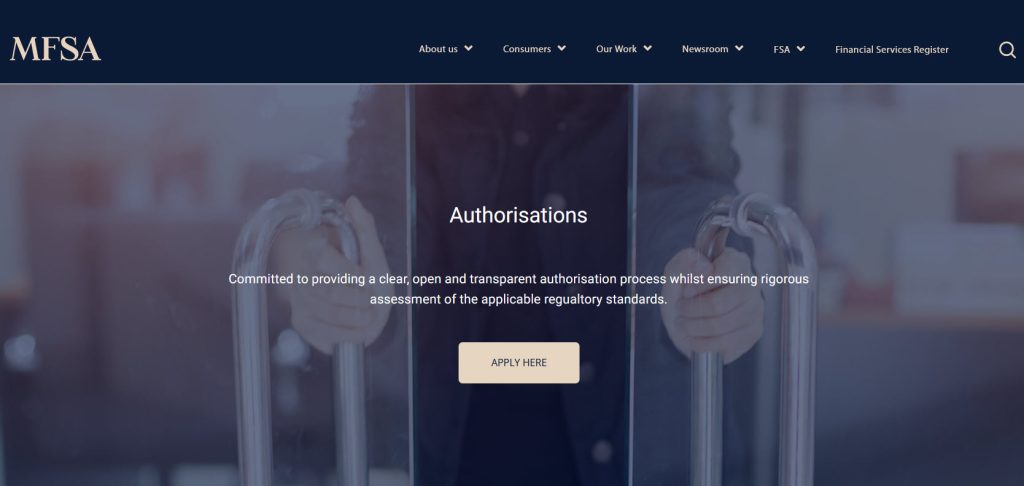In Malta, a European Union member country in the Mediterranean, the Malta Financial Services Authority (MFSA) is largely responsible for regulating and supervising financial services. This mandate encompasses the insurance, banking, pension, securities, and financial and capital market sectors.
But what exactly is the MFSA, and what are its principal functions? This article will provide you with an overview of the Malta Financial Services Authority, shedding light on its role, responsibilities, and influence within Malta and beyond.

MFSA: A brief overview
Established in 2002, the Maltese Financial Services Authority (MFSA) functions as a regulatory body for financial services, streamlining the regulatory process and offering a more comprehensive and responsive service. The Authority’s structure is robust with clearly defined departments, each having its area of focus, such as insurance and pensions, banking, securities and markets, conduct supervision, and corporate services.
Examples of notable cases
Pilatus Bank
In March 2018, the MFSA took control of Pilatus Bank, and in June that same year, the MFSA asked the European Central Bank to revoke the Pilatus’s European bank license.
Pilatus was a Maltese bank founded in 2013 and headed by Teheran-born U.S. businessman Ali Sadr Hasheminejad, who turned out to be embroiled in a money laundering scheme involving sanctioned Iranian money. The scheme was exposed by the Maltese journalist Daphne Caruana Galizia; known internationally for her investigation of the Panama Papers and for being assassinated in 2017.
In July 2018, Pilatus Bank depositors threatened to sue the MFSA for freezing €80 million in funds. In October, the bank’s directors made their own lawsuit against the MFSA. In November 2018, the European Central Bank upheld MFSA:s request and withdrew Pilatus’s European bank license.
After an 18-month investigation, a magistrate in Malta dismissed the allegations against Pilatus, and in 2020 Pilatus turned to the European Court of Justice, asking to have their banking license returned and to be awarded damages from the ECB.
SataBank
In October 2018, the MFSA froze the assets held by the SataBank due to concerns regarding money laundering. Malta´s Financial Intelligence Analysis Unit found serious breaches of the anti-money laundering rules, resulting in a €3 million fine for SataBank. The bank was co-owned by Christo Georgiev, the owner of the e-wallet LeoPay.
In November 2023, SataBank was fully liquidated and declared solvent. The official announcement, made by the appointed controller Dr. Richard Galea Debono, was published in the government gazette.
The role and responsibilities of the MFSA
The MFSA’s core roles are to uphold the integrity and stability of Malta’s financial systems, preserve consumer interest and confidence, enhance market efficiency and transparency, reduce financial crime, and safeguard Malta’s reputation in financial services.
The responsibility of the MFSA extends to all fields of financial activity, including banking, insurance, investments, and pensions. One of the key duties involves authorizing, licensing, and supervising all financial services activity, ensuring adherence to legal provisions and the satisfaction of rigorous standards. This covers a wide range of entities including banks, insurance companies, investment firms, trading platforms and funds, trust management companies, pension schemes, and financial advisors.
MFSA’s proactive approach to international standards in regulation, coupled with Malta’s attractive tax regime and experienced workforce, makes the country an attractive destination for international businesses.
MFSA’s international influence
Because of Malta’s accession to the European Union, the MFSA has become an integral part of the European financial ecosystem. Through its membership in several European regulatory bodies, including the European Banking Authority, European Insurance and Occupational Pension Authority, and European Securities and Markets Authority, the MFSA participates in policy development and decision-making processes. Moreover, MFSA’s adherence to EU regulations and directives ensures a harmonized regulatory environment, creating a level playing field for businesses operating within Malta and across borders.
The Future of MFSA
The MFSA is continually evolving to meet the demands of a fast-changing financial landscape. It’s pushing for increased transparency, enhanced investor protection, and robust regulatory standards. Furthermore, it is placing significant emphasis on emerging sectors such as FinTech, putting in place the necessary regulatory frameworks to nurture their development.
In a nutshell, the Malta Financial Services Authority represents more than just a regulatory body—it echoes Malta’s commitment to a transparent, efficient and robust financial market—one that is rooted in consumer protection and broader economic stability.
Examples of scandals and controversies
- After being appointed CEO of MFSA in 2018, Joseph Cuschieri went on more than 35 “business trips” acocompanied by his close friend Edwina Licari, costing the tax payers roughly €500,000.
- In August 2019, the MFSA became embroiled in a scandal after paying €150,000 in severance pay to its human resources department director Georgew Spiteri, even though he had been quickly rehired for a similar position at the Malta Business Registry (MBR). What made the situation sensitive was the fact that the MBR had been branched out of the MFSA just a few weeks before.
- In 2020, Joseph Cushieri resigned as CEO after his close ties to Yorgen Fenech had come to light. Fenech is the main suspect behind the assassination of investigative journalist Daphen Caruana.
Final thoughts
The MFSA, through its proactive regulation and supervision, performs a daunting task of upholding integrity in Malta’s financial industry. By adapting swiftly to emerging trends and international standards, the Authority remains instrumental in driving Malta’s growth as a global financial hub. Investing in Malta’s financial sector implies complying with MFSA’s regulatory framework, promising a secure and a competitive business sphere in return. As the torchbearer of Malta’s financial future, the MFSA continues to reinforce its dominance, not just in Malta but across the European financial landscape.
References
- Malta Financial Service Authority. (2021). MFSA Vision 2021–2023.
- European Central Bank. (2021). Role and tasks of the MFSA.
- Ministry of Finance, Malta. (2020). Financial Services in Malta.
